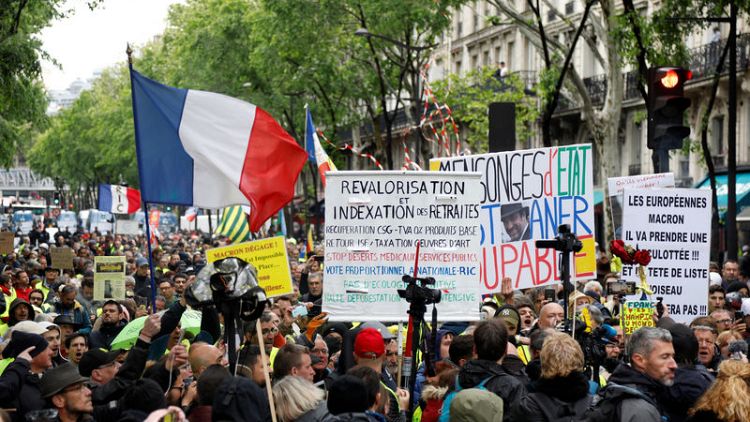PARIS (Reuters) - Fewer protesters turned out for the 25th straight weekend of "yellow vest" anti-government demonstrations in Paris and elsewhere in France on Saturday, days after a wider May Day rally was marked by violent clashes in the French capital.
The quieter nature of the demonstrations could be a relief to President Emmanuel Macron, who last week made a series of policy proposals in a bid to address the nearly six-month long series of protests.
Some 3,600 protesters were taking part in marches across the country as of 1200 GMT on Saturday, compared with 5,500 a week earlier, the Interior Ministry said.
In Paris, where three rallies had been authorised, turnout was 1,000 as of 1200 GMT against 2,600 by the same time last week.
"Many of them were shocked by the behaviour and repression of last Wednesday," Herve, one protester, told Reuters. "So it's not surprising to see that it's lagging behind a bit regarding the turnout."
In contrast, tens of thousands of labour union and "yellow vest" protesters had taken the streets across the country on Wednesday in a demonstration that saw clashes between anarchists and police, especially in Paris.
In the southwestern town of Bordeaux, a Reuters journalist estimated the number of demonstrators at several hundred people against more than 2,000 a week earlier.
The protests, named after motorists' high-visibility yellow jackets, began over fuel tax increases but morphed into a sometimes violent revolt against politicians and a government they see as out of touch.
Many in the grassroots movement, which lacks a leadership structure, have said Macron's proposals last week, which include tax cuts worth around 5 billion euros ($5.6 billion), did not go far enough and lacked details.
($1 = 0.8928 euros)
(Reporting by Antony Paone and Emmanuel Jarry in Paris, and Claude Canellas in Bordeaux, writing by Sybille de La Hamaide; Editing by Hugh Lawson)


